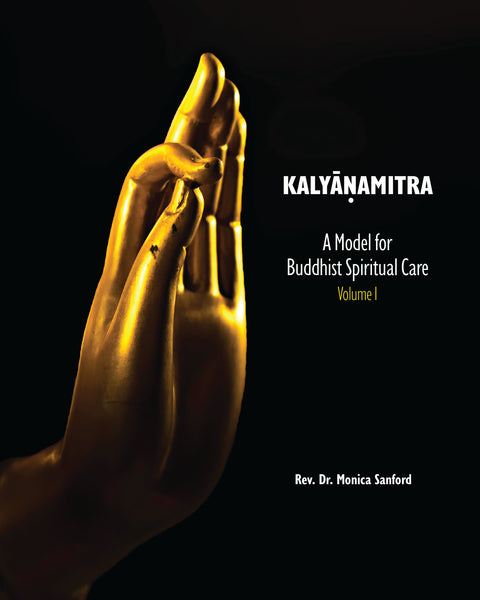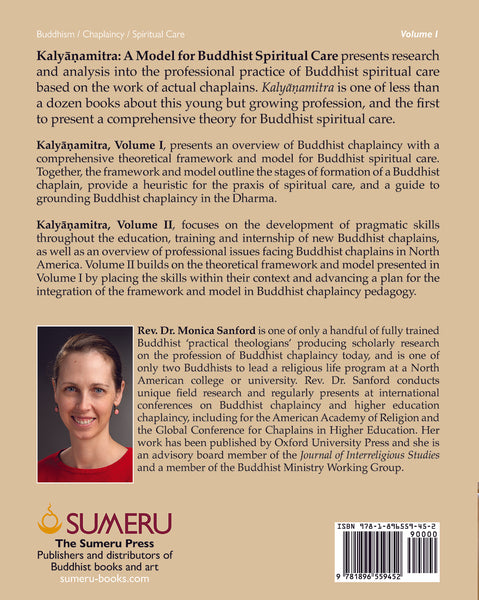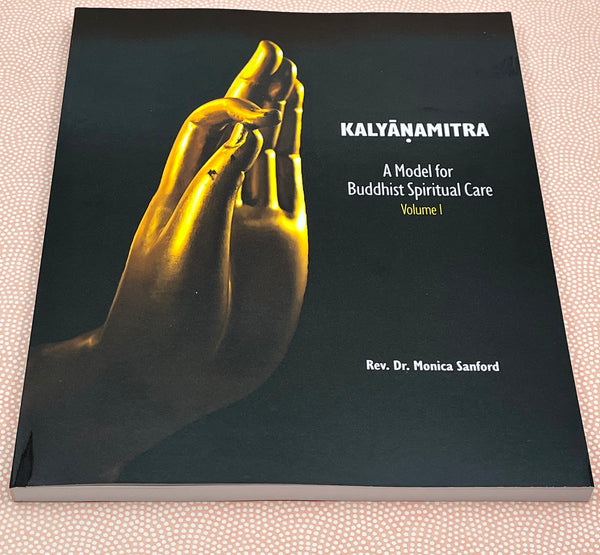Kalyāṇamitra: A Model for Buddhist Spiritual Care, Volume 1
Kalyāṇamitra: A Model for Buddhist Spiritual Care, Volume 1
Rev. Dr. Monica Sanford
ISBN 978-1-896559-45-2 (pbk) (Volume 1)
188 pages, 8x10, with bibliography and index
Kalyāṇamitra: A Model for Buddhist Spiritual Care is the book Buddhist chaplains have been waiting for. Rev. Dr. Monica Sanford presents research and analysis into the professional practice of Buddhist spiritual care based on the work of actual chaplains in hospitals and hospices, the military, prisons, and colleges. Just like their Christian counterparts, Buddhist chaplains provide spiritual care to distressed people from a variety of religious backgrounds, including people who aren’t religious at all, but still need a caring companion in times of crisis. Kalyāṇamitra is one of less than a dozen books about this young, but growing profession, and the first to present a comprehensive theory for Buddhist spiritual care.
Chapter 1 describes what a Buddhist chaplain is, including definitions of terms and vivid stories that paint the picture of the work they do. A personal narrative from Rev. Dr. Sanford outlines the process of personal and spiritual formation Buddhists experience as they learn to both be and do the work of a chaplain. The chapter concludes with an introduction to the practice of reflection, sometimes called “theological reflection,” an essential skill for putting one’s spiritual and religious knowledge to work in an interreligious and intercultural world.
Chapter 2 describes what Buddhist chaplains do, starting with a careful summary of the sources of Dharma that guide a Buddhist chaplain’s practice. Rev. Dr. Sanford reviews texts from Theravada, Mahayana, and Vajrayana sources – both ancient and modern – in a cogent and accessible way, ensuring that this work is valuable to Buddhists of any background. The chapter also describes the role of traditional teachers and sanghas in the support and formation of Buddhist chaplains. It furthers the training in reflection begun in chapter 1, before diving into a careful description of each of the contexts in which Buddhist chaplains work – healthcare, the military, prisons, and colleges and universities. It concludes with an analysis, based on data derived from Rev. Dr. Sanford’s unique study of chaplains in the field, of how to determine the effectiveness of spiritual care provided to those in need.
Now that readers have a good sense of who Buddhist chaplains are and what they do, Chapter 3 presents the first comprehensive theory of Buddhist chaplaincy – the Three Prajñās Framework for Spiritual Care. Rev. Dr. Sanford presents the Framework both evocatively, in the form of a sutta or scripture, and through the data she painstakingly collected from thirteen practicing Buddhist chaplains and analyzed over many months. She clearly breaks down the Framework into four developmental stages that describe the lifelong spiritual formation of Buddhist chaplains. Then she further breaks down each stage into a three-part heuristic that can guide the professional work of chaplains in any setting. The final stage – kalyāṇamitra or spiritual friendship – serves as a model for modern Buddhist spiritual care.
Chapter 4 presents the kalyāṇamitra model in full, including detailed review of Theravada, Mahayana, and Vajrayana literature on the topic. Rev. Dr. Sanford presents the first model for Buddhist chaplaincy suitable for Buddhists from any tradition or culture. She is also forthright about the implications, applications, and limitations of this model and her research as a whole. The final reflection invites readers to join in the work of defining the profession of Buddhist chaplaincy as an ongoing project for the benefit of all.
These four chapters comprise Volume 1 of the book, to be published in January 2021. Volume 2 will follow a few months after.
Kalyanamitra, Volume 2, focuses on the development of pragmatic skills throughout the education, training, and internship of new Buddhist chaplains, as well as an overview of professional issues facing Buddhist chaplains in North America. Skills covered in this volume include listening and responding, empathy and compassion, ritual and prayer, presence, interreligious and culturally competent care, power, privilege, and oppression in care, spiritual assessment, and reflection. The final skill – reflection – assists the reader to integrate their personal and professional practice to become a wise and compassionate Buddhist chaplain. The volume concludes by charting a path for the further development of the field of Buddhist chaplains in North America.
Volume 2 builds on the theoretical framework and model presented in Volume 1 by placing the skills within their context and advancing a plan for the integration of the framework and model in Buddhist chaplaincy pedagogy.
ABOUT THE AUTHOR
Rev. Dr. Sanford received a B.S. in Design from the University of Nebraska – Lincoln, a M.Div. in Buddhist Chaplaincy, and a Ph.D. in Practical Theology (spiritual care and counseling) from Claremont School of Theology, making her one of only a handful of Buddhist chaplains who are also fully trained “practical theologians.” She is the only one currently conducting, publishing, and presenting field research on the work of Buddhist chaplains in interreligious settings in North America. Rev. Dr. Sanford is also one of only two Buddhist chaplains to lead a religious life program at a college or university, making her a rare scholar-practitioner.
Rev. Dr. Sanford has contributed chapters to various Buddhist and interreligious anthologies, co-authored the article on “Buddhist Chaplaincy” for the Oxford Research Encyclopedia (with Rev. Dr. Nathan Jishin Michon). She has now literally written the book on Buddhist chaplaincy – the first one to present a comprehensive theory of the profession suitable to Buddhists of all traditions and cultures. She regularly presents at international conferences on these topics. She is on the advisory board of the Journal of Interreligious Studies and a member of the Buddhist Ministry Working Group. Her current research project is “Mapping Buddhist Chaplains in North America,” in collaboration with Harvard Divinity School, Brandies University, and others.
She teaches at the Harvard Divinity School.
WHAT PEOPLE ARE SAYING
An invaluable, inspiring, and groundbreaking guide to the emerging field of Buddhist chaplaincy and spiritual care, Kalyanamitra: A Model for Buddhist Spiritual Care, provides us with a map, a way, a path to follow as we respond to the world in need. Rich, nuanced, and deeply rooted in Buddhist teachings, I will return to this book again and again.
cst.edu/academics/faculty/duane-bidwell/









